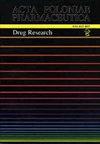曲妥珠单抗与甘贝母酸对MDA-MB-453乳腺癌症细胞系的协同作用
IF 0.4
4区 医学
Q4 PHARMACOLOGY & PHARMACY
引用次数: 0
摘要
曲妥珠单抗是治疗乳腺癌最常用的单克隆抗体之一。它是有效的,因为它与HER2受体结合并抑制增殖和转移的信号通路。然而,异质性乳腺癌的各种信号通路导致的内在或获得性耐药降低了其疗效。为提高疗效,可与不同药物联合治疗。本研究通过体外实验研究曲妥珠单抗联合甘草酸对乳腺细胞系MDA-MB -453的协同作用。孵育12、24、48、72 h时,采用XTT法测定其抗增殖作用。使用CompuSyn.exe软件计算本研究的综合指数(CI)值。在第72小时,12.5µg/mL曲妥珠单抗+ 1.25µM甘草酸(CI-4)获得最高的协同效应。同时测定了抗氧化酶过氧化氢酶(CAT)的活性。我们观察到曲妥珠单抗和甘草酸联合用药可在24、48和72小时降低CAT活性。结果表明,在靶向药物设计中,藤黄酸可能与其他药物联合使用。本文章由计算机程序翻译,如有差异,请以英文原文为准。
Synergistic effects of trastuzumab and gambogic acid on MDA-MB-453 breast cancer cell line
Trastuzumab is one of the most commonly used monoclonal antibodies in the treatment of breast cancer. It is effective because it binds to the HER2 receptor and inhibits the signaling pathways for proliferation and metastasis. However, intrinsic or acquired resistance resulting from the various signaling pathways of heterogeneous breast cancer reduces its efficacy. To increase its efficacy, it is combined with different agents in the treatment. In this study, the synergistic effect of the combination of trastuzumab and gambogic acid on the breast cell line MDA-MB -453 was investigated in vitro. At the end of 12-, 24-, 48-, and 72-hour incubation, their antiproliferative effects were determined by XTT method. Combination Index (CI) values of the study were calculated using CompuSyn.exe software. The highest synergistic effect was obtained with 12.5 µg/mL trastuzumab + 1.25 µM gambogic acid (CI-4) at the 72nd hour. The activity of the antioxidant enzyme catalase (CAT) was also measured for the applications. We observed that combination of trastuzumab and gambogic acid decreased CAT activity at 24, 48 and 72nd hours. It was concluded that gambogic acid may be a good candidate for combination with other agents in targeted drug design.
求助全文
通过发布文献求助,成功后即可免费获取论文全文。
去求助
来源期刊
CiteScore
0.80
自引率
0.00%
发文量
74
审稿时长
6-12 weeks
期刊介绍:
The international journal of the Polish Pharmaceutical Society is published in 6 issues a year. The journal offers Open Access publication of original research papers, short communications and reviews written in English, in all areas of pharmaceutical sciences. The following areas of pharmaceutical sciences are covered: Analysis, Biopharmacy, Drug Biochemistry, Drug Synthesis, Natural Drugs, Pharmaceutical Technology, Pharmacology and General.
A bimonthly appearing in English since 1994, which continues “Acta Poloniae Pharmaceutica”, whose first issue appeared in December 1937. The war halted the activity of the journal’s creators. Issuance of “Acta Poloniae Pharmaceutica” was resumed in 1947. From 1947 the journal appeared irregularly, initially as a quarterly, then a bimonthly. In the years 1963 – 1973 alongside the Polish version appeared the English edition of the journal. Starting from 1974 only works in English are published in the journal. Since 1995 the journal has been appearing very regularly in two-month intervals (six books a year). The journal publishes original works from all fields of pharmacy, summaries of postdoctoral dissertations and laboratory notes.

 求助内容:
求助内容: 应助结果提醒方式:
应助结果提醒方式:


